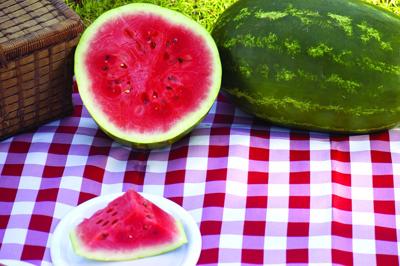Lifestyle
Discover the Nutritional Benefits of Watermelon This Summer

Watermelon is not just a popular summertime treat; it also offers numerous health benefits that make it an excellent addition to any meal. As temperatures rise, this refreshing fruit provides a nutritious option for those looking to complement their summer barbecues. With its low calorie count and high water content, watermelon stands out as both a tasty and health-conscious choice.
Low-Calorie Delight
One of the key advantages of watermelon is its low calorie content. According to the Mayo Clinic, a single cup of watermelon contains just 46 calories. In contrast, traditional desserts like ice cream contain significantly more calories, with one cup of vanilla ice cream having 274 calories and chocolate ice cream 286 calories, as reported by the United States Department of Agriculture. This makes watermelon an appealing dessert alternative, especially for those who want to indulge without compromising their dietary goals.
Hydration and Nutritional Value
Another noteworthy benefit of watermelon is its ability to promote hydration. The Harvard T.H. Chan School of Public Health emphasizes the importance of adequate hydration for regulating body temperature and supporting overall health. Watermelon, composed of approximately 92% water, can help maintain hydration levels during hot summer days, making it an ideal snack for outdoor activities.
In addition to hydration, watermelon is a good source of essential vitamins. The National Institutes of Health highlights that watermelon provides 14% of the recommended daily value (DV) of vitamin C per USDA dietary guidelines. This vitamin is crucial for maintaining a healthy immune system. Watermelon also contains 5% of the recommended DV of vitamin A, which supports vision and immune function.
Moreover, watermelon is free from fat, cholesterol, and sodium. This makes it a healthier option compared to many other desserts that may contribute to higher fat and cholesterol intake. By choosing watermelon over traditional sweets, individuals can enjoy a guilt-free treat that aligns with their health objectives.
In summary, watermelon is more than just a refreshing summer snack. With its low calorie count, high water content, and essential vitamins, it serves as a nutritious option that complements various meals and outdoor gatherings. As people embrace the summer season, incorporating watermelon into their diets can be a delicious way to stay hydrated and healthy.
-

 Technology5 months ago
Technology5 months agoDiscover the Top 10 Calorie Counting Apps of 2025
-

 Health2 months ago
Health2 months agoBella Hadid Shares Health Update After Treatment for Lyme Disease
-

 Health3 months ago
Health3 months agoErin Bates Shares Recovery Update Following Sepsis Complications
-

 Technology4 months ago
Technology4 months agoDiscover How to Reverse Image Search Using ChatGPT Effortlessly
-

 Technology1 month ago
Technology1 month agoDiscover 2025’s Top GPUs for Exceptional 4K Gaming Performance
-

 Technology2 months ago
Technology2 months agoElectric Moto Influencer Surronster Arrested in Tijuana
-

 Technology5 months ago
Technology5 months agoMeta Initiates $60B AI Data Center Expansion, Starting in Ohio
-

 Technology5 months ago
Technology5 months agoRecovering a Suspended TikTok Account: A Step-by-Step Guide
-

 Health4 months ago
Health4 months agoTested: Rab Firewall Mountain Jacket Survives Harsh Conditions
-

 Lifestyle5 months ago
Lifestyle5 months agoBelton Family Reunites After Daughter Survives Hill Country Floods
-

 Technology4 months ago
Technology4 months agoHarmonic Launches AI Chatbot App to Transform Mathematical Reasoning
-

 Technology3 months ago
Technology3 months agoUncovering the Top Five Most Challenging Motorcycles to Ride





















